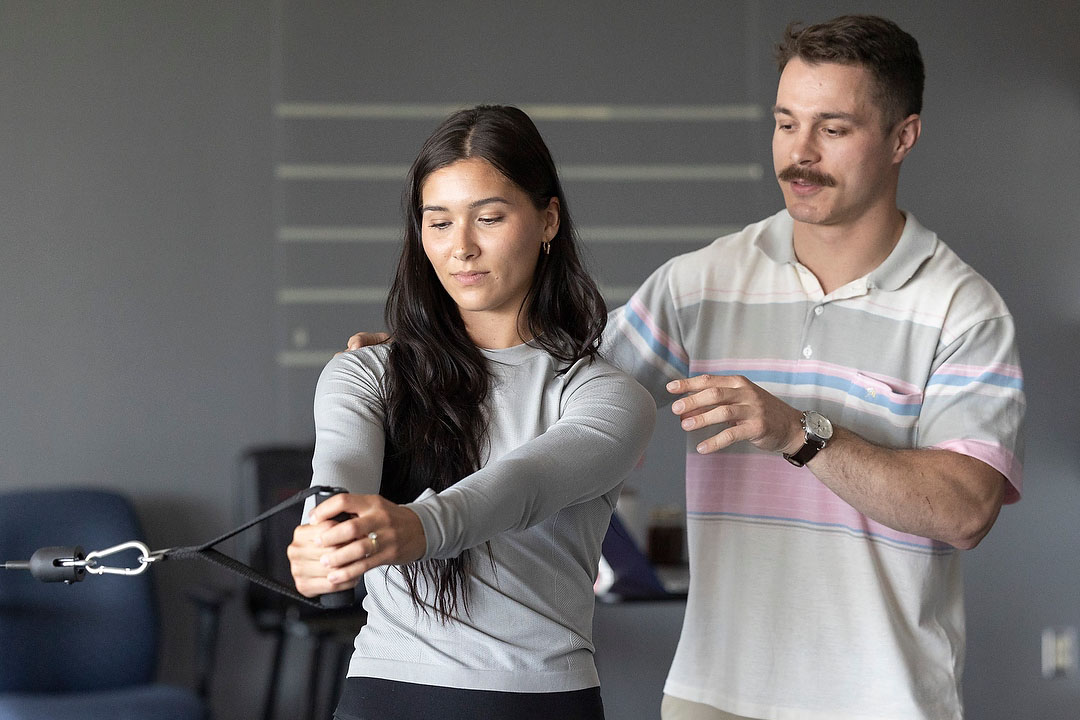
Rehabilitation science at USask celebrates 60 years of impact
SASKATOON – Today, the University of Saskatchewan (USask) celebrates 60 years of training physical therapists.
Close to 90 per cent of physical therapists in the province are USask grads, contributing immensely to the quality of life for residents.
“This milestone achievement reminds us of the tremendous contributions our university has made and continues to make to the well-being of citizens across Saskatchewan through research and training of high-demand health professionals,” said USask President Peter Stoicheff.
What began in 1965 as a 2 ½-year diploma program in physical therapy, with an initial cohort of 20 students in facilities located at the Saskatoon airport, transitioned to a bachelor’s degree and moved to St. Andrew’s College on campus in 1973.
The School of Physical Therapy was established within USask’s College of Medicine in 1976 and evolved to a Master of Physical Therapy in 2007, training 40 students annually. In 2016 the school was relocated to the Health Science Building and in 2018 was renamed the School of Rehabilitation Science in anticipation of expanding program offerings.
Recent funding from the provincial government has supported further growth. Physical therapy training seats increased to 55 annually in 2023, and two new-to-Saskatchewan master’s programs are in development. Occupational therapy (OT) and speech-language pathology (SLP) programs will start in fall 2026, each admitting up to 40 students annually.
“Congratulations on the 60th anniversary of this vital program — an incredible milestone that reflects decades of dedication to health education and community care,” Advanced Education Minister Ken Cheveldayoff said. “Graduates, alumni and faculty from the University of Saskatchewan’s School of Rehabilitation Science have made a tremendous impact across the province. I look forward to the school’s continued success with the launch of its new occupational therapy and speech-language pathology programs.”
Dr. Brenna Bath (PhD), the school’s director, notes the array of community-based services provided by physical therapists, covering the lifespan in settings such as acute care and rehabilitation hospitals, private and public sector clinics, and across health conditions that go far beyond the expected bone, joint, or muscle injuries to include everything from chronic lung diseases to neurological conditions.
Occupational therapists and speech-language pathologists also provide care across the lifespan in diverse areas of practice. Occupational therapists are uniquely qualified to support independent living and improve quality of life. For example, they have core competencies in mental health and addiction services, pediatric services, health promotion and chronic disease management, and team-based care for people with a range of health conditions. Speech-language pathologists focus on identifying and treating speech, language, social language, swallowing, learning, and communication disorders.
These expansions will allow for greater access to critical health services in Saskatchewan and provide a unique training experience for all three rehabilitation health professions to train together.
Another area of impact is the school’s innovative clinical placements, which make up one-third of the curriculum. Students train under the supervision of volunteer clinicians, giving trainees a phenomenal opportunity to gain experience in various settings across the province.
New placements implemented by the school at the Saskatoon Field House have provided access to services for patients with complex neurological conditions. Students have also been training alongside physicians in primary care, increasing access to care for underserved populations. This includes joining nursing and dental assistant students at USask’s Prince Albert campus this fall.
Beyond training, research conducted by faculty and their collaborative teams has resulted in the implementation of new ways of care and the development of different service models. The school is also a leader in areas of Indigenization and decolonization. This includes an Indigenous initiatives co-ordinator, the first-of-its-kind in a Canadian rehabilitation program, and an active nistotamawin circle leading activities that foster a more inclusive and supportive environment.
“The school has made a significant impact on the quality of care in Saskatchewan — through its focus on training, research and social accountability,” said Dr. Sarah Forgie (MD), dean of the College of Medicine. “This impact will continue to grow with the expansion and delivery of critical new training programs.”
The added funding for these expanded programs is an integral part of the Saskatchewan government’s Health Human Resources Action Plan, which has invested more than $300 million since 2022 in initiatives to expand the health professional workforce. Along with the OT and SLP programs, USask also received $2 million to develop a Master of Physician Assistant Studies program, meant to support physicians and increase access to primary care services throughout the province.
-30-
For media inquiries, contact:
Victoria Dinh
USask Media Relations
306-966-5487
victoria.dinh@usask.ca

